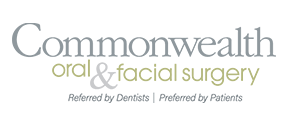At Commonwealth Oral & Facial Surgery, we realize that having any surgery can be stressful. Our desire is to have your post-operative course progress as smoothly as possible. These instructions provide some general guidelines with regards to post-operative care; your doctor may give you additional instructions as well. Thank you for choosing Commonwealth Oral & Facial Surgery.
Exposures and Uprighting
Surgical Packing
Do not disturb the wound. If a surgical packing was placed, leave it alone. The packing helps keep the tooth exposed and protected. If it gets dislodged or falls out within 48 hours, call our office for further instructions. After 48 hours, don’t worry; it is normal for it to come out.
Bleeding
Do not disturb the surgical site. Some oozing or redness in the saliva is normal for the first 24 hours. Excessive bleeding which results in your mouth rapidly filling with blood can frequently be controlled by biting pressure on a gauze pad for 30 minutes. If the tooth was uprighted (placed into the correct position), don’t bite directly on the gauze, as it can push the tooth back in to the position it was prior to surgery. If bleeding continues please call our office for further instructions. If a tooth is exposed on the roof of the mouth, gauze held in place with finger pressure may help stop the bleeding.
Swelling
Swelling can be a normal occurrence after surgery. In some instances swelling can be worse or peak on the third to fourth day after surgery. Should the swelling increase beyond this time period, or be accompanied by severe pain or an elevated temperature, then please notify your doctor. To minimize swelling, apply an ice pack/ bagged frozen peas or corn to the outside area that the surgery occurred in. A good rule for proper circulation is to keep the ice pack in place for 20 minutes at a time then rest for 20 minutes. Please apply ice packs for 48 hours starting the day of surgery. Another aid that can be used is frozen seedless grapes. Apply the grape between the surgical site and the cheek. This applies pressure and coolness. When laying down keep your head propped up on a couple of pillows, this will help reduce swelling.
Discomfort/Medications
You may have been given prescriptions for one or more pain medications to help manage post operative discomfort following your surgery. However, in some cases moderate discomfort can be controlled with Tylenol or an anti-infl ammatory medication (Advil/Motrin/Ibuprofen; Aleve/Naprosyn; Etodolac). Anti-infl ammatory medications can be alternated with a narcotic medication in most cases. Take these and all medications as prescribed and in the manner indicated by your doctor. It is a good idea to begin taking your pain medications while you are still numb.
While taking narcotic pain medications, do not drink alcoholic beverages, drive, or operate any machinery for 24 hours after the last dose of narcotic pain medicine. Some patients experience nausea and or vomiting as a result of narcotic pain medications. Please be sure to eat at least 30 minutes before taking your pain medication because this could reduce your risk of nausea. If you have a persistent problem with nausea or vomiting, please notify your doctor.
Antibiotics
If you have been placed on antibiotics, take them as directed. If you have an unfavorable reaction such as a rash, please discontinue the medication and call the office for further instructions.
Oral Hygiene
Mouth cleanliness is essential to good healing. Start rinsing 24 hours after your surgery. Rinse with warm salt water (1/2 teaspoon of salt to an 8 oz cup of warm water) three to four times a day. Use the salt water rinse in addition to any other rinses prescribed by your doctor. You may begin to brush your teeth 24 hours after surgery, and be gentle in the region(s) of the surgery.
Diet
Drink plenty of fluids; however avoid hot/steamy hot foods and liquids. Cool soft food and liquids should be eaten on the day of surgery. You may return to a normal diet, as tolerated, beginning the day after surgery but avoid crunchy food (popcorn, pretzels, and potato chips) for a week after surgery, as these could become lodged and irritate the surgical area. If the tooth was uprighted (placed into the correct position), stay with soft foods until your post op appointment, usually within 7-10 days after surgery.
Activities
Risk of falling: If you have been given sedation and/or narcotic medication there is a chance you may become light headed/dizzy. Extra caution must be used to prevent falling.
Resume normal activities a day or so after surgery, or as directed by doctor. Please keep physical activities to a minimum immediately following surgery.
Avoid smoking for as long as possible following surgery. We strongly recommend one full week.

